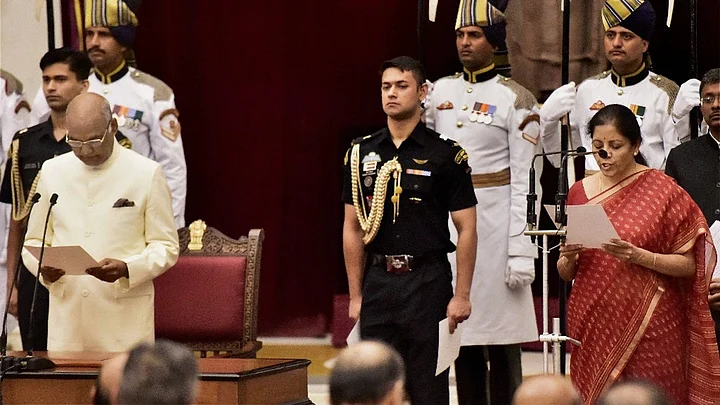Nirmala Sitharaman, on 3 September, became India’s second woman defence minister after Indira Gandhi, as Prime Minister Narendra Modi’s Cabinet was reshuffled for the third time ahead of the 2019 general elections.
The new minister has her task cut out as the “Make In India campaign in defence has not taken off yet”, Dhiraj Mathur, partner and leader of National Aerospace and Defence Practice at PwC India told BloombergQuint.
Having come from the commerce and industry ministry, which is championing the Make in India program, and being familiar with foreign direct investment and foreign trade policies should serve her well to push Make In India.Dhiraj Mathur, Partner & Leader, National Aerospace and Defence Practice
Arun Jaitley has held the defence portfolio as an additional charge ever since state elections in Goa in March this year, which saw Manohar Parrikar moving to the state as chief minister.
Pushing back infiltration attempts by Pakistan in Jammu & Kashmir and the recent standoff in Doklam have been the ministry’s key challenges.
Here’s What Sitharaman Should Follow:
Bharat Karnad, research professor in National Security Studies at the Centre for Policy Research outlined a five-point agenda for Sitharaman to pursue:
1. The strongest armament system in the country's arsenal is the Brahmos supersonic cruise missile. Its production has to be rapidly ramped up to meet India’s military needs and for speedy exports to Southeast Asian countries as a means to ensure that China behaves.
This will require the total transfer of technology by the defence public sector undertaking, Brahmos Aerospace, to two or three private sector companies to rapidly augment its production.
2. Revert to the option Parrikar had decided on by way of planning a force structure for the Indian Air Force – have just three types of aircraft, the indigenous Tejas LCA for short-to-medium-range air defence, and Su-30 MKI for strike and air superiority missions and join with Russia in developing the Russian-origin PAK/FA Fifth Generation Fighter Aircraft.
This will streamline and simplify both the operational and, more importantly, the logistics aspects of running the air force, which is currently saddled with 27 different types of aircraft.
3. Push the maximum involvement of capable and competent private sector defence firms in designing, developing, and manufacturing the next generation diesel submarine, Project 75i. One such company is L&T which is producing the nuclear powered Arihant class ballistic missile firing strategic submarines.
But this is preferably not in partnership with the French firm DCNS, which has fatally compromised its Scorpene submarines being constructed at the Mazgaon shipyard, Mumbai, by leaking classified information about it last year to the Australian and other media.
4. Make ‘Make in India’ a practical proposition by extensively involving the private sector defence industry. In any and every make project involving any weapon system, setting up private sector competition with DPSUs which alone will assure high quality work and service support.
5. Cut the buy from Russia of the T-72/90 tanks; promote the indigenous Arjun main battle tank instead.
There’s no other way to make the country independent in hardware for mobile warfare.
It will be interesting to see if Sitharaman has the kind of political leverage that a more senior person could have had when she sits with Prime Minister Modi, Rajnath SIngh, Sushma Swaraj and Arun Jaitley, said Aditi Phadnis, Political Editor of Business Standard.
Bhaskar Kanungo of industry body FICCI, however, expects Sitharaman’s appointment to give foreign defence equipment manufacturers “new assurance and confidence, leading to much-needed time-bound reforms that are essential for bringing FDI in defence and aerospace”.
Her vision on ‘Make in India’ will help bridging gap between foreign original equipment manufacturers and Indian defence and aerospace industry.Bhaskar Kanungo, Deputy Director-Strategic Trade, FICCI
(This piece was first published in BloombergQuint.)
(#TalkingStalking: Have you ever been stalked? Share your experience with The Quint and inspire others to shatter the silence surrounding stalking. Send your stories to editor@thequint.com or WhatsApp @ +919999008335.)
